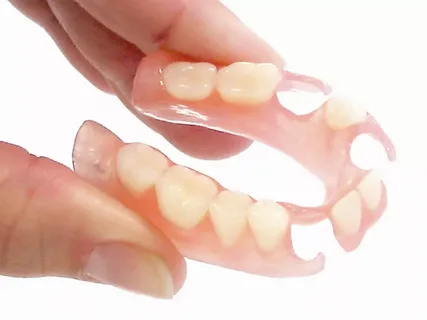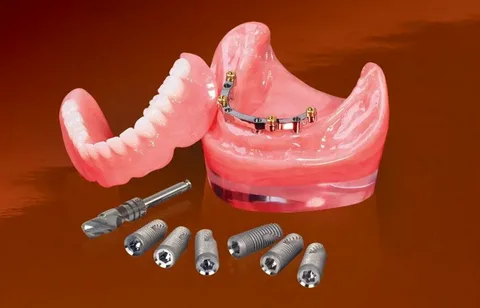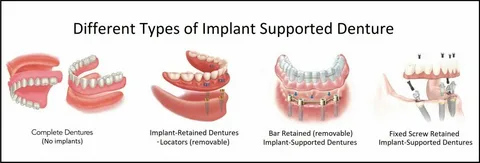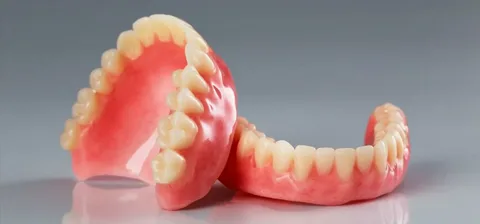Dentures
Dentures are removable dental appliances designed to replace missing teeth and restore both the function and appearance of a person’s smile. They are custom-made to fit the gums and can replace a few missing teeth (partial dentures) or a full set of teeth (complete dentures). Dentures help people with missing teeth to eat, speak, and smile confidently, and are one of the most common solutions for tooth loss.
Dentures are a practical solution for people with missing teeth, offering restored functionality, improved appearance, and increased self-confidence. While they may take some time to adjust to, modern dentures are designed to fit comfortably and blend seamlessly with your natural teeth. Regular dental check-ups and proper care will ensure that your dentures provide you with long-term benefits.
Types of Dentures
Complete Dentures:
- Description: These are used when all teeth are missing in the upper or lower jaw. Complete dentures cover the entire dental arch.
- Appearance: The denture is designed to mimic the look of natural teeth and gums, providing a lifelike appearance.
- Pros: Restore the ability to chew, speak, and smile normally.
- Cons: May require adjustments over time as the shape of your gums and bone structure change.
Partial Dentures:
- Description: Partial dentures are used when only some teeth are missing. They are attached to existing natural teeth with clasps or precision attachments.
- Appearance: Partial dentures can be designed to blend with your natural teeth, offering a discreet solution.
- Pros: Fill gaps caused by missing teeth, and can help prevent other teeth from shifting out of position.
- Cons: May need to be adjusted periodically to maintain a proper fit.
Implant-Supported Dentures:
- Description: These dentures are supported by dental implants, providing a more secure and stable fit compared to traditional dentures.
- Appearance: Just like regular dentures, but with the added advantage of being anchored in the jaw.
- Pros: More comfortable and stable, as they are anchored by implants, reducing the risk of slippage.
- Cons: Requires surgical placement of implants, which may not be suitable for everyone.
Benefits of Dentures
Restoring Function:
- Dentures restore the ability to eat and speak properly, making daily tasks easier and more comfortable. They help you chew food, pronounce words more clearly, and improve facial aesthetics.
Improving Appearance:
- Dentures are custom-designed to look like natural teeth, restoring your smile and improving your self-confidence. They also support the structure of the face, preventing the sunken look that often accompanies tooth loss.
Preserving Oral Health:
- Dentures can help prevent remaining natural teeth from shifting out of place, which could lead to bite issues and further tooth loss.
How Do Dentures Work?
Initial Consultation:
- The process begins with a consultation with a dentist or prosthodontist who will evaluate your oral health and determine if dentures are the right solution.
Impressions and Measurements:
- Impressions of your mouth are taken, and your dentist will also measure the size and shape of your gums to ensure that the dentures will fit comfortably.
Creating the Denture:
- A dental laboratory uses the impressions to create a custom denture. This process usually takes several weeks, and you may be provided with a temporary denture while the final one is being made.
Fitting and Adjustments:
- Once your dentures are ready, your dentist will place them and check for fit and comfort. Adjustments may be made to ensure they fit well and allow you to speak and eat comfortably.
Follow-up Appointments:
- After receiving dentures, you may need follow-up visits to make any necessary adjustments as your gums heal and adapt to the dentures.
Caring for Dentures
Cleaning:
- Dentures should be cleaned daily with a soft-bristled toothbrush and a special denture cleaner. Avoid using regular toothpaste, as it may scratch the surface.
- Soak dentures overnight in a denture solution to keep them moist and maintain their shape.
Avoiding Damage:
- Be gentle when handling dentures, as they can break or bend. When removing them, do so carefully to avoid applying too much pressure.
Regular Check-ups:
- Regular dental visits are important to ensure that your dentures fit well, remain in good condition, and do not cause any discomfort or irritation to your gums.
Key features about Dentures

Custom Fit

Restores Functionality

Available in Different Types
Frequently asked questions
Here are descriptions for FAQs about Dentures to provide a clear understanding:
Dentures are removable dental appliances that replace missing teeth and restore the function and appearance of your smile.
Dentures are designed to fit the gums and jaw, replacing lost teeth. They help with chewing, speaking, and restoring the look of your smile.
- Complete Dentures: For full tooth loss.
- Partial Dentures: For missing some teeth.
- Implant-Supported Dentures: Anchored to dental implants for better stability.
The process can take 4–6 weeks, as your dentist needs to create a custom set of dentures based on impressions of your mouth.
Initial discomfort or irritation may occur, but with time and proper adjustment, dentures should become more comfortable.

